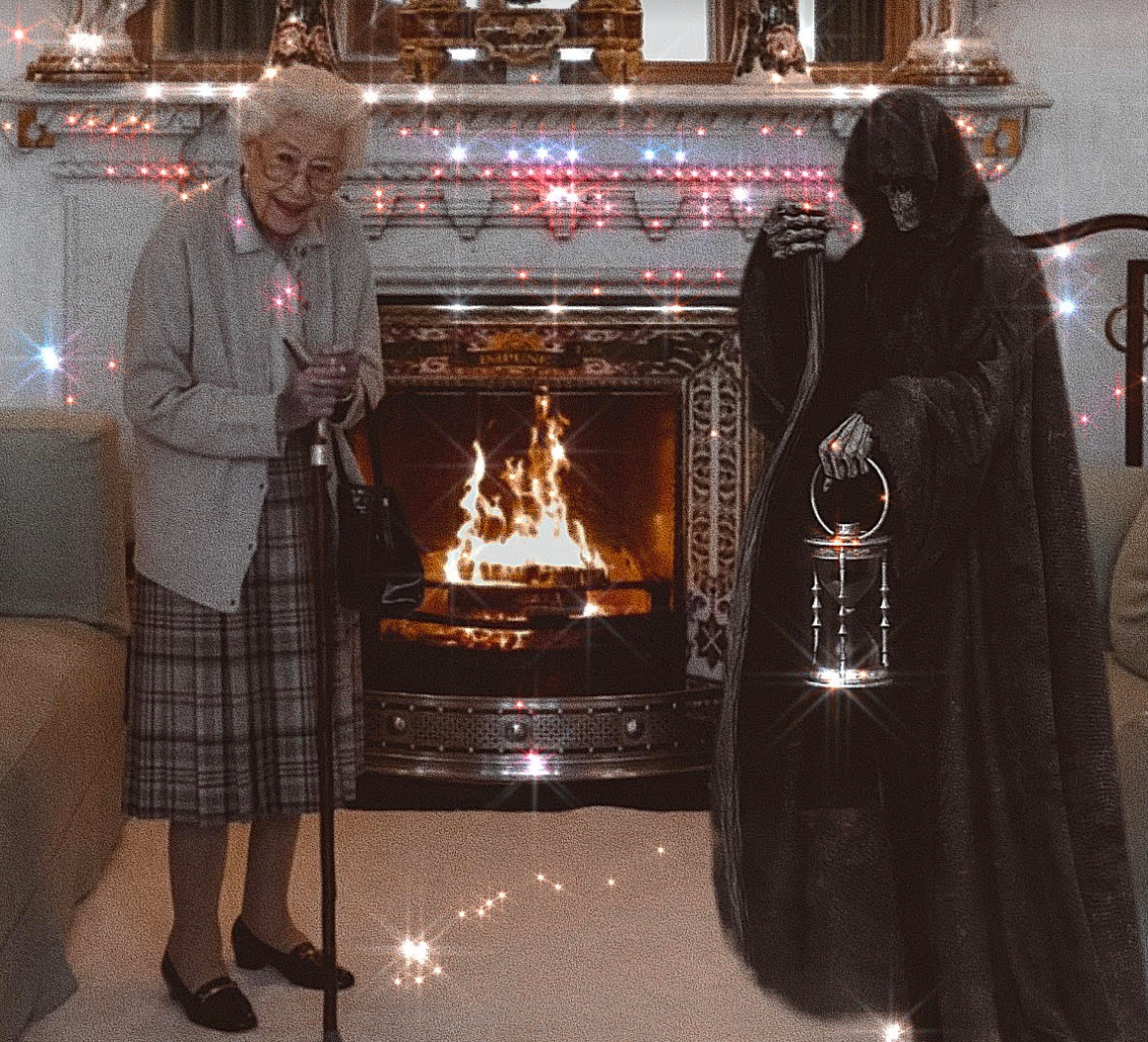She was one of those rare figures one never could have imagined dying. Like Putin or Cheney (because evil never dies). Elizabeth II has been such a fixture on “the global scene” for so long that it was difficult for anyone—regardless of what generation they fell in—to ever envision an England in which The Queen would cease to reign over it. And yet, the “transcendental” Taurean has done just that: ceased altogether. Kicked the bucket, fled this “realm.”
Having inspired all manner of pop culture, however sardonic and biting (ranging from Sex Pistols’ “God Save the Queen” to The Smiths’ inevitable prophecy The Queen Is Dead to, er, The Queen’s Corgi), Elizabeth II’s influence upon the masses can’t be denied. Regardless of what one felt about her and her “ilk.” And, of course, many did not (and do not) feel too “warmly.” That is to say, the British royals are synonymous with being parasitic do-nothings. So “do-nothing,” in fact, that certain members of the Establishment could find little else to occupy their time apart from becoming a sexual predator and pedophile.
Regarding this particular prat, it was evident that the Queen did not always put duty above motherhood, for the “right proper” thing to do would have been, at the bare minimum, to strip her wayward son of all his titles, not just the military ones and “His Royal Highness.” For “Duke of York” still remains. And even that seems like nothing more than a slap on the wrist considering his crimes. In addition to the how the Queen could never and would never bring herself to publicly speak out against the monster that she herself created.
To be sure, Queen Elizabeth was no saint, despite her present depiction as one for merely “always being a constant” whenever England has been in a state of flux (which is far too often). Yet those types of things aren’t “permissible” to say about a queen, least of all a dead one. That’s when the real undeserved reverence comes, with phrases like “complicated legacy” used to describe Britain’s “unpleasant” history with colonialism. And how the royals have uniquely benefitted from it more than any other British “sect.” Not only as a means to plunder riches, but to paint themselves as “all-powerful” for having dominion over so many “inferior” nations beyond just Britain. Hence, the once-relevant phrase referring to the extent of England’s “kingdom” making it “the empire on which the sun never sets” (get it? Because its territories were so far-reaching that there was always daylight in at least one of the “colonies” it “owned”).
And so, if there truly is an afterlife, which many people foolishly believe in as a means to tout something like “karma,” the Queen isn’t likely to enter the “good place,” if we’re going to be candid about it. Even so, some part of her was always at peace with the reality of dying, if made apparent by nothing other than her refusal to breed any more corgis after 2015. The reason being that she did not want to “leave any behind.” Perhaps her most endearing quality being her unwavering love of dogs.
Yet if she loved them so much, she would have made damn certain there was no way in hell said creatures would end up in Prince Andrew’s likely bestial care. Alas, since he was the one who “broke the rules” (quelle surprise) by gifting her Muick and Fergus as a means to console her after Prince Philip’s death, he’d be a likely candidate to take on the “task.” But even Andrew, at sixty-two years old, might not be the best choice, age-wise (in addition to morality-wise), to care for the Queen’s most truly prized children.
And even her real ones won’t be much longer for this world (sorry Charlie). Nonetheless, while we must all sooner or later acknowledge that Death is real, and no amount of wealth or privilege can barter with it, somehow one genuinely tended to believe that, of all people, Elizabeth II might just evade the reaper. In fact, one almost expected that she should at least make it to a hundred years old “on principle.” Plus, arriving at such an age would have put her ahead of her unspoken nemesis, Louis XIV, in terms of holding the record for “longest-reigning sovereign”—a somewhat polite turn of phrase for “you’ll have to pry power from my cold, dead hands.” Which is precisely what “King” Charles III has now done. A man who clearly wanted to subconsciously embody his mother’s love of dogs by choosing a name that would be associated with a very adorable breed of spaniel.
Those Britons who feel “lost at sea” (which is easy to succumb to on an island) might do well to remember that the Queen once said, at the end of 1997 (the year of Diana’s death), “Joy and sadness are part of all our lives. Indeed, the poet William Blake tells us that ‘joy and woe are woven fine, a clothing for the soul divine, under every grief and pine runs a joy with silken twine.’”
More than anything, Elizabeth’s demise represents the very unequivocal fact (that all wealthy old people in power would do well to remember) that Death never leaves anyone unchecked off his list. And perhaps not since Betty White dying just before 2022 commenced (eighteen days shy of her one hundredth birthday) were we all reminded that even the “toughest old broad” can’t keep fighting forever. And most, apart from the rich ones, wouldn’t want to anyway. For a long life isn’t much worth enduring without gobs of money, and the according ease of living that comes with it.





















